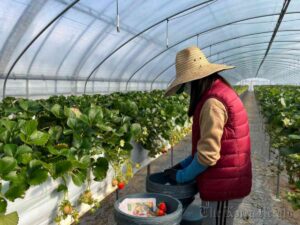Italy, renowned for its rich agricultural heritage, offers significant employment opportunities for farm workers, including non-citizens. These jobs, particularly attractive to workers from South Asian countries, provide competitive wages and reasonable working hours, making them a sought-after option for individuals seeking stability and better economic prospects.
Opportunities for South Asian Workers
Italy’s agricultural sector relies heavily on manual labor, especially during harvesting seasons. Workers from countries such as Pakistan, India, Bangladesh, and Nepal have found these jobs a viable means to support their families back home while contributing to Italy’s economy. The demand for farm workers spans various crops, including olives, grapes, tomatoes, and citrus fruits, reflecting Italy’s diverse agricultural output.
Farm worker jobs in Italy are accessible to non-citizens, as long as they meet immigration and work permit requirements. The Italian government periodically releases quotas under the “Decreto Flussi,” allowing foreign workers to legally enter and work in the country. This system creates a structured pathway for South Asians to find employment in Italy’s fields.
Salary and Work Conditions
Farm worker jobs in Italy offer attractive financial benefits. The minimum wage for such roles is approximately 16 USD per hour, a considerable sum compared to wages in many South Asian countries. This income provides workers the opportunity to save money, invest in their families’ well-being, or fund future endeavors.
The workday typically lasts from 9:00 AM to 5:00 PM, providing an eight-hour shift with reasonable working conditions. Most farm employers comply with labor laws, ensuring workers receive adequate breaks, protective gear, and suitable accommodation where required. However, it is advisable for workers to confirm these terms during their recruitment process to avoid exploitative practices.
Challenges and Considerations
While these jobs present significant opportunities, there are challenges. Language barriers and cultural differences can initially be daunting for South Asian workers. Learning basic Italian or understanding common phrases can significantly enhance communication and integration.
Additionally, seasonal work means employment may not be year-round. Workers must plan their finances and explore options for off-season employment. Agencies or unions supporting agricultural workers can provide guidance in this regard.
Another critical aspect is obtaining legal work permits. South Asian workers should rely on verified recruitment agencies to avoid fraudulent practices. Ensuring all documentation is in place before travel can prevent legal complications upon arrival in Italy.
How to Apply
Interested individuals can explore farm worker opportunities through Italian embassies, authorized recruitment agencies, or online job portals specializing in agricultural work. The “Decreto Flussi” announcement is a key event for aspiring workers, as it outlines quotas and application procedures for non-citizens.
Conclusion
Farm worker jobs in Italy are a promising opportunity for non-citizens, especially those from South Asia. Offering fair wages of $16 per hour, structured work hours, and a chance to work in one of the most agriculturally rich countries in the world, these roles can provide financial stability and personal growth. By preparing well, adhering to legal channels, and embracing the cultural experience, South Asian workers can make the most of these opportunities in Italy’s thriving agricultural sector.
